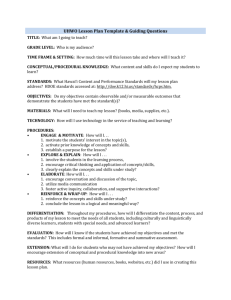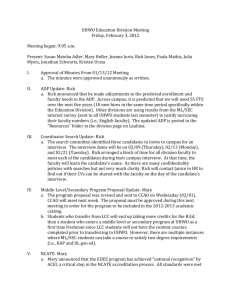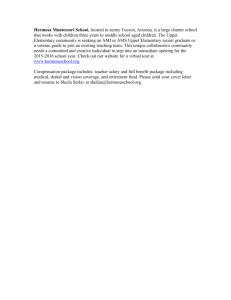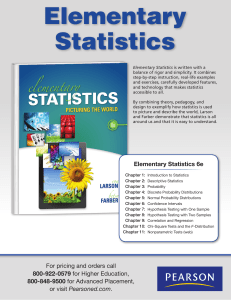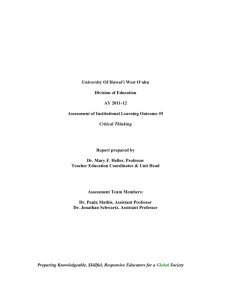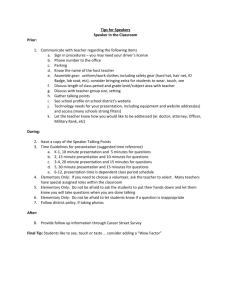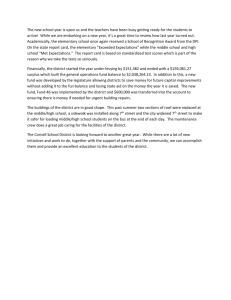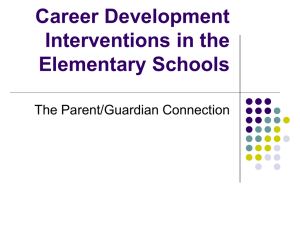2007 - University of Hawai`i
advertisement
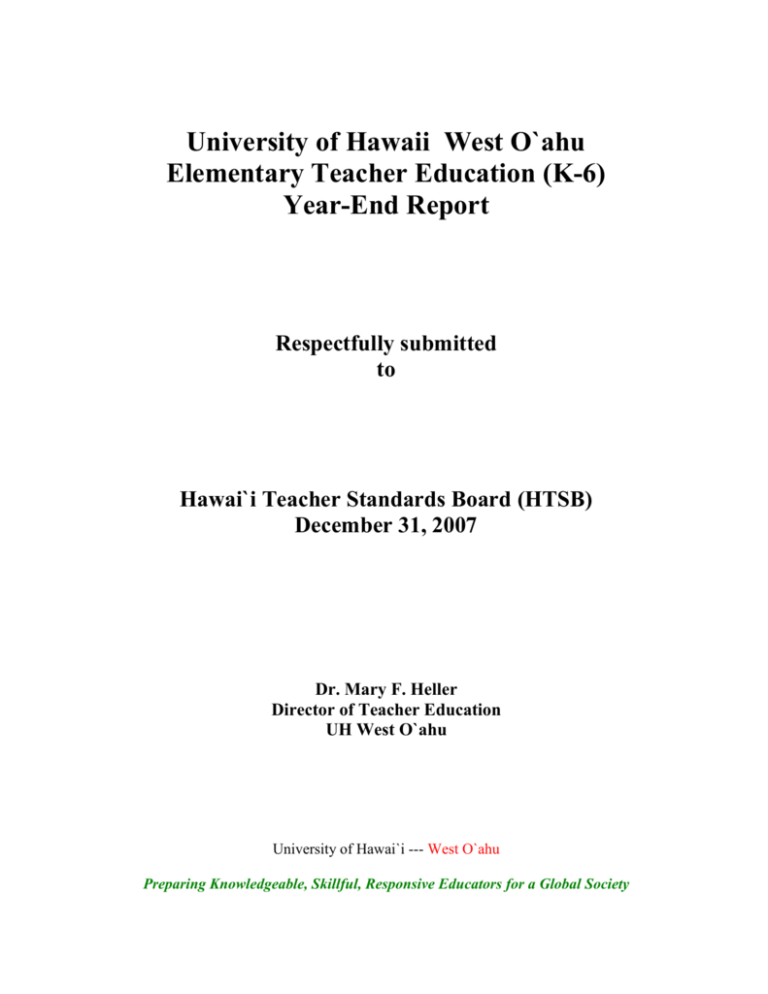
University of Hawaii West O`ahu Elementary Teacher Education (K-6) Year-End Report Respectfully submitted to Hawai`i Teacher Standards Board (HTSB) December 31, 2007 Dr. Mary F. Heller Director of Teacher Education UH West O`ahu University of Hawai`i --- West O`ahu Preparing Knowledgeable, Skillful, Responsive Educators for a Global Society Why We Want to Teach By UHWO Teacher Candidates EDEE 201, Introduction to Teaching as a Career Section 1 Fall 2007 I want to be a teacher so I can create positive learning experiences for children everyday. I want to be a teacher because I want to provide children with constant reassurance, as they blossom into their true individual selves. I want to be a teacher because I want to give back to the community by helping educate the younger generation. I want to be a teacher to because it is one of the most challenging careers I know and where each day is a new day. I enjoy showing children new things and watching them realize that they just learned something new. I want to make a difference in each child’s life. I want to be a teacher to help secure our future, which lies in the hands of our children. I want to teach the children how to make their dreams come true. I want to be a teacher because I want to help each child that I come in contact with reach or go beyond their full potential. I want to be a teacher because teaching is an ongoing learning process in which both students and teachers can learn from one another. I want to “be there” for the children who don’t have anyone who can. I want to be a teacher because I will be able to teach children to work together and that mistakes are okay. I want to be a positive mentor and role model. Hawaii needs teachers very badly, and I want to help. I love the look on children's faces when they have the confidence to do things for themselves, and it was their teacher who guided them. I want to be a teacher so I can teach my students that they can be whatever they want to be! When I look into the eyes of children, I see hope, and I want to help them. I am encouraged by knowing that being a teacher affords me a unique and foundational opportunity to be a positive influence on the lives of children. I want to excite, empower, and explore every day. 2 OVERVIEW In November 2006, the Hawai`i Teacher Standards Board (HTSB) officially granted provisional (3-year) approval of the University of Hawai`i West O`ahu (UHWO) Elementary Teacher Education Program, effective December 1, 2006. Under the leadership of Dr. Mary F. Heller, UHWO Director of Teacher Education, recruitment of students and staff began immediately, in preparation for the inaugural academic year, 2007-08. The purpose of this year-end report is two-fold: 1) to provide descriptive data on elementary education majors and teacher education faculty, and 2) to describe minor programmatic changes that have taken place, in meeting the needs of teacher candidates. In particular, changes to the Conceptual Framework are the direct result of UH West O`ahu's becoming a 4-year institution, effective fall 2007; changes to Preconditions are in response to newly revised institutional outcomes, pre-professional and professional teacher education curriculum delivery, and field-based professional development school (PDS) initiatives. Fall 2007 Descriptive Data Teacher Candidates: 54 Elementary Education Majors Gender: 10 men 44 women Classification: 5 Freshmen 49 Continuing, Returning, or Transfer students Hometown: Pearl City Aiea Waipahu Wahiawa Ewa Beach Kapolei Millilani Kaneohe Kailua Kahuku Haleiwa Haulua Honolulu Waianae 4 3 6 3 7 6 6 2 1 1 3 1 4 7 3 UHWO Teacher Education Faculty: 3 full-time, tenure-track elementary education faculty Dr. Mary F. Heller, Ed.D., Oklahoma State University Director of Teacher Education Discipline: The English Language Arts Dr. Julia Myers, Ed.D, Montana State University Discipline: Math Education Dr. Jonathan Schwartz, PhD, University of Arizona Disciplines: Special Education, Literacy, & Technology 2 full-time, tenure-track early childhood/elementary education faculty Dr. Susan Matoba Adler, PhD, University of Wisconsin---Madison Disciplines: Early Childhood & Multicultural Education Dr. Jeanne Iorio, Ed.D, Teachers College, Columbia University Disciplines: Early Childhood & Creative & Performing Arts in Education 2 part-time, temporary elementary education faculty Dr. Deborah Zuercher, PhD, Kent State University Discipline: Creative & Performing Arts; Field Supervision Mrs. Mitzie Higa, MS, National University Discipline: Social Studies 2007-08 Tenure-track Elementary Education Faculty Search: 3 full-time, tenure-track elementary education faculty positions advertised: Disciplines: Science, Social Studies, & English as a Second Language (ESL) New hires will join UHWO faculty in fall 2008. 4 THE CONCEPTUAL FRAMEWORK In academic year 2006-07, UHWO received approval from the University of Hawai‘i Board of Regents to change its mission, add new bachelor degree programs, and establish a lower division curriculum, thus making UHWO a four-year regional comprehensive university. In addition to the Bachelor of Education (B.Ed.) degree in Elementary Education, UHWO offers Bachelor of Arts (BA) degrees in Humanities, Social Sciences, Business Administration, and Public Administration; and the Bachelor of Applied Sciences (BAS). UHWO is fully accredited by the Western Association of Schools and Colleges (WASC). The new UHWO mission is as follows: “The mission of the University of Hawai’i West O’ahu is to become a four-year, comprehensive university with an emphasis on baccalaureate education founded in the liberal arts, serving professional, career-related, and applied fields, based on state and regional needs. UHWO is committed to providing access to residents throughout the state of Hawai’i through its partnerships with the UH community colleges and its delivery of distance education programs.” www.uhwo.edu Admissions & General Education. The UHWO change in its mission statement did not affect Teacher Education program goals to address the demand for highly qualified teachers in the State of Hawai`i, particularly in Central and Leeward O`ahu and on the Waianae Coast. However, the establishment of a lower division, general education curriculum impacted the Bachelor of Education admissions policies and program of study, as follows: Effective Fall 2007 Undergraduate students (teacher candidates) may declare Elementary Education as their major, upon admission to the University of Hawai`i West O`ahu. A 3-credit hour, Children's Literature (200-level or above) course is required of all Elementary Education majors and may be credited towards fulfilling the Diversification category of the General Education Curriculum. All incoming transfer students must have a minimum of 24 transferable, lowerdivision credits or an Associate of Arts degree from an accredited institution. Standards-based Accreditation. In preparation for a fall 2007 Western Association of Schools and Colleges (WASC) accreditation visit, the UH West O`ahu faculty engaged in professional development activities for the purpose of rewriting its institutional Learner Outcomes (ILO's). Because the UHWO Elementary Teacher Education Program is "Standards-based," all curricular areas are aligned with NCATE, State of Hawai`i, and UHWO content and performance standards. The following new, UHWO Institutional Learner Outcomes will thus be integrated across the undergraduate teacher education curriculum: 5 The University of Hawai`i West O`ahu Institutional Learning Outcomes Graduates of UH-West O`ahu will be able to: Written communication: demonstrate clear and effective writing for an intended audience. Clear and effective writing is demonstrated within and across disciplines, utilizing wide-ranging genres. Example written communications may include (but are not limited to) narrative, descriptive, expository, and persuasive prose, developed in the context of essays, research papers, position papers, technical writing, reflections, creative writing, lesson plans, and letters. Oral communication: demonstrate clear and effective speaking skills when communicating with an intended audience. Clear and effective speaking skills are demonstrated within and across disciplines. Example oral communications may include (but are not limited to) narrative, descriptive, expository, and persuasive discourse, in the context of preparing and delivering a speech; giving a class presentation; leading a small group discussion; lecturing on or explaining a topic; debating an issue. Quantitative Literacy: apply mathematical reasoning to obtain accurate results in solving problems. Includes using numerical data and concepts such as numbers, percentages, estimates, tables, graphs, charts, and diagrams to understand and solve problems) Global and indigenous perspectives: analyze issues from multiple cultural perspectives to articulate an understanding of the interconnectedness of local and global issues. Includes understanding of local and global linguistic, political, social, economic, environmental, religious, family, educational, etc. systems. Focus is on multi/crosscultural perspectives and frameworks that address local and global issues and concerns and their inter-connectedness. Critical thinking: demonstrate critical thinking skills by applying knowledge, technology, and information to solve problems and make decisions in socially responsible and ethical ways. Includes using research skills, technology, knowledge, ideas, concepts, theories, information, etc. to solve problems and make decisions responsibly and ethically. 6 Pre-professional and Professional Field-based Curriculum Content & Delivery The University of Hawai`i West O`ahu Teacher Education program is committed to serving the needs of its targeted audience of teacher candidates, especially those residing on Central and Leeward O`ahu and the Waianae coast. The original, 2006 program proposal called for delivery of the upper division teacher education curriculum over a three-year period1. The spirit of this design was to encourage students who work either full or part-time to pursue their goals of becoming teachers and returning to their communities. Thus, UHWO provides the often underserved student with access to a manageable teacher education program close to home. The following course additions/adjustments were made to the originally proposed curriculum, in order to meet the needs of our students. Student needs are continuously assessed via on-campus courses, on-line surveys, and individual advising sessions. Data gathered from these assessments serve to inform the content and delivery of the program. Field-Based Curricula I. Additions [New courses not in original proposal] EDEE 200 Early Field Experience 1 credit EDEE 201 Introduction to Teaching as a Career 1 credit The 1 credit Early Field Experience is comprised of 45 hours of supervised field experiences that engage the preservice teacher candidate in a Professional Development School (PDS)2 teaching and learning environment3. This course requires weekly reflections that are grounded in critical thinking about issues in teaching and learning, along with attention to the ethical standards of the teaching profession. Introduction to Teaching as a Career is a 1 credit, on-campus course taken concurrently with the early field experience. This course introduces the teacher candidate to the process of becoming a credentialed classroom teacher in the State of Hawai`i via the UHWO professional teacher education program. Topics include: an overview of UHWO 1 The 120 credit hour Bachelor of Education (B.Ed.) degree program may be completed in a minimum of four years. For students who need more time to complete their program of study, UHWO prides itself in flexible course scheduling that includes late afternoons, evenings, and online offerings. 2 All field placements are grounded in an emerging Professional Development School (PDS) model.Thus far, Holomua Elementary School, Ewa Beach, and Hale Kula Elementary, Schofield Army Base, have partnered with UH West O`ahu to prepare highly qualified teachers. 3 Teacher Candidates who are full-time Educational Assistants (EAs), Paraprofessional Teachers (PPTs), or regular classroom teachers may complete their field-based requirements at work, under the supervision of their school administrator or a peer mentor. 7 teacher education, K-6; Teaching career goals; Philosophy of Teaching and Learning; Reflections on Teaching and Learning as inspired by the Early Field Experience. In addition to reflections on teaching and learning, students also initiate development of their electronic professional portfolio, via TaskStream. TaskStream is an electronic portfolio system used by the UHWO Division of Education to provide information to local and national accrediting bodies. Students are introduced to TaskStream during pre-professional teacher education courses. In subsequent courses, students are required to upload signature assignments that reflect Hawai`i Teacher Performance Standards, NCATE Standards, and UHWO Institutional Learning Outcomes. Completion of electronic portfolios helps to ensure that all UHWO teacher candidates possess the knowledge, skills, and dispositions necessary to become highly qualified teachers. EDEE 300 Service Learning (variable, 1-3 credits) UHWO is dedicated to serving the communities on Central and Leeward O`ahu and the Waianae Coast. In the spirit of giving back, all elementary education majors are required to participate in a minimum of 45 hours (per credit hour) of volunteer work, utilizing cultural and scientific community resources, which in turn provide the contexts for understanding the impact of educational initiatives in a global society. EDEE 415 EDEE 416 Teaching Culturally and Linguistically Diverse Learners (3 credits) Advanced Practicum (1 credit) Diversity in Hawai`i's schools is significant and complex. UHWO is committed to preparing highly qualified teachers who can engage in culturally responsive pedagogy, in meeting the needs of all children, including those whose first language is not English. Towards this end we will require all students to take a course in teaching culturally and linguistically diverse learners, with an attached practicum. This course precedes student teaching and may be taken prior to or concurrent with major methods courses. II. Adjustments [Re-arrangement of methods course content and delivery] All major methods courses, Literacy, Social Studies, Science, and Mathematics, are taught developmentally and in the context of a 45-hour, content-specific practicum. Once admitted to the Professional Teacher Education component of the program, teacher candidates may enroll in the following sequence of co-requisite methods courses: 1. Block A Primary, K-3 EDEE 420 Literacy Methods I (3) EDEE 425 Social Studies Methods I (2) EDEE 400a Practicum (1) 2. Block B Upper Elem., 4-6 EDEE 430 Literacy Methods II (3) EDEE 435 Social Studies Methods II (2) EDEE 400b Practicum (1) 3. Block C Primary, K-3 EDEE 440 Math Methods I EDEE 445 Science Methods I EDEE 440c Practicum 4. Block D Upper Elem., 4-6 EDEE 450 Math Methods II EDEE 455 Science Methods II EDEE 440d Practicum (2) (2) (1) 8 (2) (2) (1) PRECONDITIONS The continuing development of UH West O`ahu as a four-year institution and an on-going, self-assessment of the emerging teacher education program have given rise to the following changes, made in the best interest of our undergraduates: Precondition 6.1 Admission Requirements for the Teacher Education Program Pre-professional Teacher Education. Students interested in becoming Elementary Education teachers may declare Elementary Education as their major upon admission to the UH West O`ahu. An official declaration of a major in Education is required for registration into 200- and 300-level EDEE courses. Professional Teacher Education. Education majors will be granted admission to the professional component of the program (400-level EDEE courses), upon completion of the following requirements: Praxis I: Pre-professional Skills Test (PPST) Passing Sores: Reading (172), Math (173), & Writing (171) or a Composite Score of 170 Sophomore standing. 45 credits (Minimum) A grade of "C" or higher in each of the following courses: ENG 100 HUM 310 MATH 111 MATH 112 SP 151 EDEE 200 EDEE 201 Composition I and II, if applicable Writing Skills or equivalent Mathematics for Elementary School Teachers I Mathematics for Elementary School Teachers II Public Speaking or equivalent Early Field Experience Introduction to Teaching as a Career 2.5 Overall GPA The Professional Student Teaching Semester. An Application for Student Teaching must be filed in the Student Services Office by the first day of the semester preceding enrollment in the Professional Semester. The following requirements must be met prior to enrolling in the Professional Semester: Completion of all EDEE foundations, methods, and field experience courses 2.75 or higher GPA for Methods Blocks courses (400-level series) 2.5 or higher GPA with no grade lower than a "C" for all Education Courses 9 Conclusion The emergence of the UHWO Elementary Teacher Education program brings significant, positive energy to a campus that is experiencing unprecedented change, almost on a daily basis. It is indeed an exciting time, as the entire faculty moves forward in anticipation of our new campus at Kapolei, with doors opening by 2010. The rewards inherent in establishing a much needed elementary teacher education program for Central/ Leeward O`ahu and the Waianae Coast far outweigh the challenges that may lie ahead. For now, we look forward to the Spring 2008 semester, as we continue to prepare Knowledgeable, Skillful, Responsive Educators for a Global Society. 10 FINAL THOUGHTS By A UHWO Teacher Candidate EDEE 200, Early Field Experience Reflection #10 11 Reflection #10. Final Reflection. Now that you have completed your "Early Field Experience," reflect upon what you have learned about elementary school teaching and learning. How has this experience impacted you as a person emerging into the teaching profession? What did you learn? What questions remain? How have your career goals changed or become solidified, due to your experiences inside the classroom? For the purposes of this paper, I intend to reflect upon the experiences that I have had in the course of my Early Field Experience. Overall, I would say that the experience was very positive, and I am thankful for the opportunity to begin interacting with students so early into my pursuit of my degree. A lot of the other schools that I considered applying to did not include this option; the only choice was for Student Teaching at the end of the degree process. I have learned many things in this course, including the importance of concepts such as classroom maintenance, standards for performance, student-centered learning, and student expectations. This experience has reaffirmed in my mind the decision that I made to become a professional teacher. I am excited to begin my teaching career as soon as possible. I would say that the most important factor in this experience was the opportunity to observe my teacher mentor at work in the classroom. The way in which she maintained a positive and structured learning environment was impressive to say the least. There are stereotypes that exist that typify teachers as glorified babysitters, which to a certain extent may be valid on some levels. However, the importance of keeping watch over the students in the classroom cannot be underestimated. One of the greatest tools that a teacher possesses is the ability to maintain control of the classroom. Only by teaching the students to maintain order in the classroom can an effective lesson be taught to the children. I am not stating that teachers are there just to watch over the students as the 12 parents are away at work---far from it. The teacher’s role as a secondary parent to the child is fundamental to a child’s development though. Students have certain expectations about how a teacher or adult is expected to behave, and conforming to this ideal can simply be defined as professionalism in the classroom. Another factor towards the impact upon by developing ideas of what it means to be a teacher includes the ideas of student-centered learning and adapting to learner diversity. Previously, like many other people, I thought that a teacher’s sole purpose was to relay content to the student through the lecture process. I have learned the importance of student-centered learning and the one-to-one basis that this requires. I must admit that I underestimated the sheer amount of patience and devotion that this ideal requires from the teacher. Many of the students simply do not understand the material when it is originally presented to the class as a whole. For example, a teacher may present the lesson to the class in a verbal manner, which will not account for all learning styles. I have witnessed my teacher mentor modifying her lesson plans to attend to the needs of auditory learners through verbal lectures. I have also observed her writing her ideas for the lecture upon the white board in order to make material more relevant to visual learners. I have also seen kinesthetic lessons for the hands-on approach to learning, with the students being given rulers to measure boxes in order to determine surface area. The teacher has always made sure she was available to the students for individual lessons as well. Through the process of one-to-one teaching, a teacher is able to make the content more relevant to the individual learning style that a student may have. Each student has unique needs that simply cannot be addressed when presenting a lecture to the entire class. Some students 13 require more attention than others, while yet some students may simply act out because they desire attention of any kind. In conclusion, a teacher takes on many roles in the classroom, and I am honored by the fact that I was given the opportunity to witness many of the roles in action during my Early Field Experience. I am enthusiastic about continuing my development as a teacher, and I am sure that this will be an experience where I will be continuously learning and adapting my preconceived notions of what it means to be a teacher. A teacher is so many things to so many people, but to me a teacher will always be a source of knowledge and inspiration. 14
